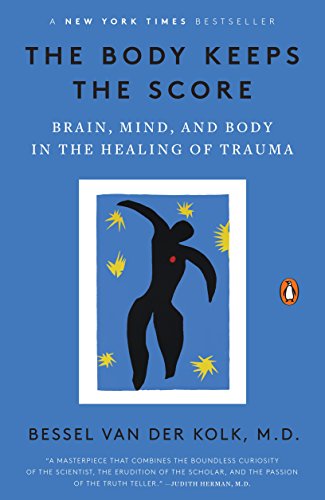
After trauma the world is experienced with a different nervous system that has an altered perception of risk and safety.
Some years back I read about a new psychiatric diagnosis called Complex PTSD. The idea is that symptoms displayed by children who’ve been subject to abuse over long periods of time are very similar to symptoms common to adults who suffer from PTSD due to trauma, as in combat. The difference is that the Complex kind is harder to treat. This is of considerable personal interest to me, for reasons I won’t detail here.
Somebody on Facebook mentioned this book, The Body Keeps the Score, by Bessel van der Kolk, and I was intrigued enough to buy the Kindle version. Turns out Dr. van der Kolk is one of the researchers who came up with the idea of Complex PTSD (which has not to date been accepted for the APA’s book of recognized diagnoses).
The major argument made in this book is that many of our psychological disorders rise from trauma, and that trauma actually makes physical changes in the brain. Current treatment tends to lean toward drug therapy, which (the author argues) only masks the problem. What we need to do is help people to retrain their brains, to reorganize the various areas of the brain to work again in a normal fashion, instead of the abnormal ways they’ve adopted in order to cope with shocks they’ve suffered.
A number of treatments are suggested and evaluated, based on Dr. van der Kolk’s extensive personal experience as a clinician and researcher. These include yoga, biofeedback, and participation in drama.
I found the book largely persuasive (as if I were qualified to judge). I absolutely agree about Complex PTSD. I’m not so sure of the author’s strong defense of Suppressed Memory – he defends it strongly, but completely ignores the numerous cases where it has been used to persecute innocent people, such as day care workers. As a Christian, I’m dubious about yoga.
And the author spoiled it to some degree, for this reader, by his political conclusions. He sees it as self-evident that what will really solve our social problems is national health care and government preschools. I am personally doubtful that bureaucracies are ever going to fill our lives with empathy and caring.
The author is also prone to fall into the refrain of, “The medical establish has never appreciated my genius.” That does raise skepticism in this reader.
But most of the book is convincing, and all of it is worth reading. Recommended, with cautions for disturbing subject matter.

You probably do well to be doubtful about “suppressed memories.” See The Memory Illusion, by Julia Shaw (who is beautiful). I haven’t read the whole book, but I looked at enough pages to see impressed.
I agree – this is largely an excellent book. It helped me understand someone close to me who has dealt with severe trauma.
You may appreciate this review from a practicing psychiatrist at Slate Star Codex, which is always an exhaustively thoughtful blog, even when he reaches conclusions I disagree with.
https://slatestarcodex.com/2019/11/12/book-review-the-body-keeps-the-score/